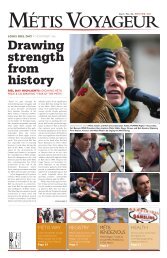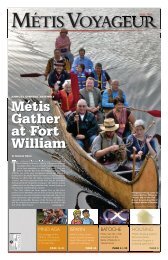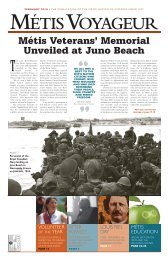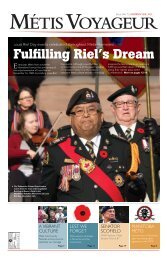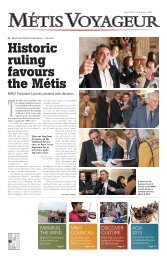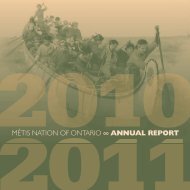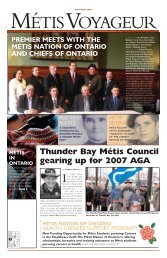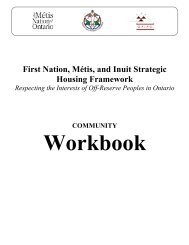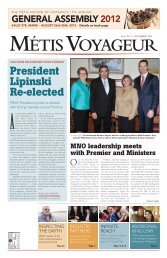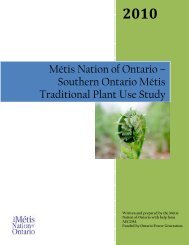Federal Progress Report - Metis Nation of Ontario
Federal Progress Report - Metis Nation of Ontario
Federal Progress Report - Metis Nation of Ontario
- No tags were found...
You also want an ePaper? Increase the reach of your titles
YUMPU automatically turns print PDFs into web optimized ePapers that Google loves.
(Left to right) Bruce Stanton, Chair <strong>of</strong> the Parliamentary Committee on Aboriginal Affairs, Shelley Glover, ParliamentarySecretary to the Minister <strong>of</strong> Indian Affairs and Northern Development, and Gary Lipinski, President <strong>of</strong> the MNO.ABORIGINAL SKILLS AND EMPLOYMENT STRATEGY (ASETS)In November 2010, the MNO became the first Aboriginal organization to be approved under the Aboriginal Skills andEmployment Strategy (ASETS). Over the next five years, the MNO will receive $30.6 million for employment andtraining programs aiding Aboriginal clients in gaining the skills necessary to acquire meaningful employment. The MNO’ssolid employment and training delivery foundation combined with an ongoing commitment to partnership and skillsdevelopment led to this significant accomplishment.BUILDING PARTNERSHIPS & CAPACITY IN EDUCATION AND TRAININGIn 2010/11, the Office <strong>of</strong> the <strong>Federal</strong> Interlocutor (OFI)provided funding to MNOET to target three specific areas:• MNO participation in a series <strong>of</strong> Memorandum <strong>of</strong>Understanding (MOU) negotiations including aground-breaking MOU with the Ministry <strong>of</strong> Education.This MOU ensures that Métis are represented at thetable in discussions related to education in <strong>Ontario</strong>.• Conducting Métis Boot Camps for regional andcommunity Councils. These boot Camps ensure thatMétis citizens across the province are informed andempowered with the tools to be advocates for Métisconcerns, history and, culture.• MNO participation in the Urban Aboriginal EducationPilot Project. Led by the province, this three year studylooks to highlight best practices in Aboriginal educationin <strong>Ontario</strong>.3
HEALTH &WELLNESSCommunity Action Program forChildren (CAP-C): The Health andWellness Branch is doing importantwork with funding provided by thePublic Health Agency <strong>of</strong> Canada. TheCAP-C enables communities todevelop comprehensive, culturally appropriate programsto improve health and development <strong>of</strong> children (aged 0-6) and their families living in conditions <strong>of</strong> risk. Thisprogram is running full-time in Thunder Bay and Drydenand part time in Bancr<strong>of</strong>t.Family and community participation has increasedsignificantly, particularly at the Thunder Bay site. Thisincrease is partially due to the recent establishment <strong>of</strong> theItty Bitty <strong>Metis</strong> Play group. The Bancr<strong>of</strong>t site has foundgreat success with its Baby and Beyond program.Canadian Prenatal/PostnatalNutrition Program (CPNP): ThePublic Health Agency <strong>of</strong> Canada fundsthe CPNP headquartered in MNO’sThunder Bay <strong>of</strong>fice. This communitybasedprogram <strong>of</strong>fers culturally relevantinformation and training to at-risk Aboriginal womenand their babies. The general focus <strong>of</strong> this program isprenatal care, child nutrition and development <strong>of</strong>parenting support. In 2009/10 the program had 30ongoing participants.Métis culture remains at the fore front <strong>of</strong> each <strong>of</strong> theseprograms through the placement <strong>of</strong> Michif language oncalendars and posters throughout the program centres.Chronic Disease SurveillanceResearch Initiatives: The PublicHealth Agency <strong>of</strong> Canada providedfunding to undertake chronic diseasesurveillance research initiatives in theMétis population. This initiative, titledthe Chronic Disease Surveillance Project, began inMarch 2008 with the “scrubbing” <strong>of</strong> registry data toenable the MNO to anonymously cross referenceregistry data with provincial health records through theInstitute <strong>of</strong> Clinical and Evaluative Sciences. With thisdata, the Branch will conduct data “runs” in three chronicdiseases. Two have been identified – diabetes and cancerprevalence, the third will be determined based on thefindings <strong>of</strong> the diabetes and cancer investigations.This year, the Public Health Agency <strong>of</strong> Canada invitedthe Métis <strong>Nation</strong> <strong>of</strong> <strong>Ontario</strong> to submit a 5-year ChronicDisease Surveillance strategy. A work plan wassubmitted and the MNO Health and WellnessBranch was awarded funding through to 2015to continue and expand the reach <strong>of</strong> theprevious surveillance work.4
MÉTIS RIGHTSPowley Implementation: Followingthe release <strong>of</strong> the Powley decision, theOffice <strong>of</strong> the <strong>Federal</strong> Interlocutor (OFI)has worked with the Métis <strong>Nation</strong>alCouncil and its Governing Members toassess and implement the decision in acooperative and responsible manner. Since 2004, theMNO has worked with OFI and received funding as a part<strong>of</strong> the federal government’s post-Powley work. Theseefforts have supported garnering a better understanding <strong>of</strong>Métis rights in <strong>Ontario</strong> as well as assisting the MNO inenhancing its Registry, as an objectively verifiable means toidentify Métis citizens and rights-holders in the province.MNO Registry: For four years, the MNO has receivedcapacity funding to strengthen its Registry <strong>of</strong> Métis citizens,as a part <strong>of</strong> OFI’s Powley implementation strategy.This funding has enabled the MNO to begin implementingstrategies and processes related to the creationand management <strong>of</strong> an objectively verifiable membershipsystem, developing approaches for implementation <strong>of</strong>responsible harvesting regimes and enhancing relationswith national and regional partners, Notable among thiswork is the creation <strong>of</strong> a digitized Registry database thatprovides simpler and quicker access to applicant andcitizen information, and has also allowed for the secure<strong>of</strong>f-site storage <strong>of</strong> Registry files. The MNO Registry hasmade remarkable changes given its challenging budget,and remains focused on improving Registry efficiency,integrity and service.Most recently, OFI’s Post Powley Program has allowedthe MNO to initiate the Métis Identification and RegistryConsultation process, a two year undertaking, whichincludes a series <strong>of</strong> community meetings aimed at gainingcitizen’s insights into citizenship policies. The process willbe completed in 2012.Community-Based Research onMétis Communities: As a part <strong>of</strong>the MNO’s tripartite process withCanada and <strong>Ontario</strong>, significant workhas been undertaken over the last fewyears to develop a partnership-basedresearch model for the identification <strong>of</strong> historic andcontemporary Métis communities in the province, whichmeet the requirements <strong>of</strong> the Powley decision.Recently, the MNO, Canada and <strong>Ontario</strong> have finalizedterms <strong>of</strong> reference in order to pursue this type <strong>of</strong> collaborativeresearch in the Mattawa/Nippissing region <strong>of</strong> theprovince. Unlike other research projects, this initiative willallow the Métis community to actively participate and be apartner in the initiative from beginning to end. It isexpected that research project will formally begin in 2011.5
FINANCE ANDADMINISTRATIONIn 2009/10, the Office <strong>of</strong> the <strong>Federal</strong> Interlocutorprovided funding to allow the MNO to undertakethe enormous task <strong>of</strong> modernizing and streamlining amore efficient and accountable financial system and toincrease the number <strong>of</strong> finance staff to assist with thework from 5 to 8 people.In 2007/08, the MNO reported on 55 programfunding agreements. This grew to 89 in 2009/10; a62% growth.With the modernized financial system and theincrease in staff to assist in the day to day operations,the Finance Branch can manage the workload <strong>of</strong> theMNO and report with confidence to its stakeholders.HOUSINGResidential RehabilitationAssistance Program (RRAP):Canada Mortgage and Housing Corporationsfunds the MNO Housing Branchin Thunder Bay to act as a deliveryagent for the RRAP. This programprovides low-income homeowners financial assistance toconduct home repair and rehabilitation in order to meethealth and safety standards, or to add secondary suits toaddress overcrowding issues. The program is also meantto address emergency housing issues and accessibilityimprovements for people with disabilities.Home Adaptations for Seniors IndependenceProgram (HASI): The MNO Housing Branch alsoadministers the HASI. This program grants forgivableloans to seniors to make adaptations within the home sothat they may live independently. The demand for theseprograms far exceeds the available financial capacity;however the Branch does its best to meet the everincreasingneeds.Business Development Officer:Through funding from Indian Affairsand Northern Affairs Canada (INAC)the MNO has been able to hire aBusiness Development Officer (BDO)to assist Métis entrepreneurs in identifyingand developing business opportunities and accessingfinancial support services. The BDO has also worked tocreate and nurture relationships with industry. In March2010, the MNO hosted a Métis Business Forum for Métisbusiness to network and learn about existing resourcesavailable through both federal and provincial funding. Aswell, the MNO has worked in partnership with theMinistry <strong>of</strong> Aboriginal Affairs to establish an AboriginalBusiness Directory. The MNO is anxious to identify Métisbusinesses so that they may take advantage <strong>of</strong> the businessopportunities that are becoming available throughwork with industry proponents.6
LANDS,RESOURCES &CONSULTATIONSDarlington Nuclear Project: In 2010, the CanadianEnvironmental Assessment Agency provided support forMNO involvement in the Darlington New Nuclear JointReview Panel process. This funding provided MNO withthe capacity to conduct a technical review with the assistance<strong>of</strong> a consulting firm and to provide comments andrecommendations pertaining to the project to the federalPanel. The Panel’s review process is on-going, and theMNO anticipates that it will have an opportunity topresent its comments at a hearing in early 2011.Collecting Métis Traditional Knowledge: EnvironmentCanada also provided funds to conduct a traditionalknowledge workshop on Woodland Caribou and toconsult on Environment Canada’s Woodland CaribouRecovery Strategy. This funding has ensured that theMétis way <strong>of</strong> life is promoted and that Métis-specificknowledge pertaining to Woodland Caribou has beenrespectfully collected and reported on to government.Collection <strong>of</strong> Information on Métis Harvest in<strong>Ontario</strong>: Environment Canada awarded the MNOfunding over four years to support the collection <strong>of</strong> informationon the MNO harvest in <strong>Ontario</strong>. The primaryactivity is the design, preparation, distribution, collectionand analysis <strong>of</strong> the MNO Harvester Survey. The harvestsurvey provides a valuable snapshot <strong>of</strong> the MNO harvestin <strong>Ontario</strong>, and has allowed for an important data sharingrelationship between Environment Canada and theMNO.Great Lakes Water Quality Review: MNO was alsoable to participate in the Great Lakes Water QualityReview through support from Environment Canada. AnMNO representative participated on the StakeholderAdvisor Panel.Species at Risk Program: In 2010, EnvironmentCanada’s Species at Risk Program provided the MNOwith support to conduct traditional knowledge collectionand integrate species at risk into the MNO traditionalknowledge database.Aquatic Inland Habitant Program: In 2010, theDepartment <strong>of</strong> Fisheries and Oceans Aquatic InlandHabitat Program, committed to a 3 year funding arrangementso that the MNO could conduct traditional knowledgecollection, initiate community aquatic habitatprograms, and develop an inland habitat managementprogram that incorporates traditional knowledge.7
MNO HOUSING INVESTMENTSINCORPORATIONThis year the Tripartite Funding, which includesfunding from the Office <strong>of</strong> the <strong>Federal</strong> Interlocutor(OFI) and the Ministry <strong>of</strong> Aboriginal Affairs (MAA),has been directed to the establishment <strong>of</strong> the Métis<strong>Nation</strong> <strong>of</strong> <strong>Ontario</strong>’s Housing Investments Incorporation(MNOHII). OFI has additionally provided funding todevelop a detailed implementation plan and marketingstrategy based on the MNOHII’s five-year business planto support the start up <strong>of</strong> the MNOHII.The focus <strong>of</strong> the MNOHII is on four key businesslines: market-housing development; commercial andcommunity development; property management andtechnical services; and training and renewable energy.The MNOHII currently delivers the Métis BuildingSystems Technical Advisors Internship Program(MBSTAIP). Funding for this program is provided HumanResources and Skills Development Canada and administeredby Service Canada. The program is aimed at developinga workforce <strong>of</strong> highly skilled building inspection andenergy conservation advisors. Upon successful completion<strong>of</strong> the MBSTAIP, the graduates will be positioned forfull-time employment with either the MNO, in relatedindustry fields or with other provincial housing providers.The first cohort <strong>of</strong> students began training in January <strong>of</strong>2010, with the next intake scheduled for January 2011.8



![Clinical Significance Report [PDF] - Metis Nation of Ontario](https://img.yumpu.com/50793350/1/190x245/clinical-significance-report-pdf-metis-nation-of-ontario.jpg?quality=85)
